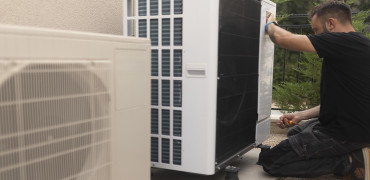With rising borrowing costs, a plunging pound and a seemingly stagnant economy, 2025 has not got off to the most promising of starts.
However, while the state of the nation’s finances will be of genuine cause for concern for many hard-pressed households, there is a general acceptance that our economic fortunes will continue to fluctuate over the coming years, sometimes up and sometimes down.
The fiscal roller-coaster may be on a downward spiral right now, but at some point in the hopefully not too distant future there is likely to be a change of direction.
The shortage of installers needs fixing for heat pumps to become more widely accepted
The heat is on
The same cannot be said for the other story that led news bulletins at the turn of the year – confirmation that 2024 trumped a decade of high temperatures by being the hottest year since records began.
On average, global temperatures were 1.6°C higher than pre-industrial times with the consequent extreme weather conditions – raging fires in California, floods in Spain and typhoons in the Philippines – only too evident.
Most experts predict that without a dramatic reduction in the use of fossil fuels, we’re not going to be able to reverse the devastating impact of climate change any time soon.
Legally-binding targets
Some might argue that it will be too little too late, but the UK is now only 25 years away from seeing if it can achieve its 2050 net zero goal.
The Labour government has not shied away from targets, pledging to cut carbon emissions by 81% by 2035 compared to 1990 levels, and a transition to low carbon heating solutions such as heat pumps is considered to be a key part of realising its carbon reduction ambitions.
Recent years have seen record sales figures, although an estimated 80,000 sold in 2024 mean that installation levels are dwarfed in comparison to gas boilers and remain modest compared to many other European countries such as France and Germany.
Towards the end of last year, a number of positive measures were announced to further encourage the transition away from fossil fuel heating, including further funding for the ongoing Boiler Upgrade Scheme (almost doubling the budget for grant vouchers to £296m for the next financial year), the removal of some planning restrictions for the installation of heat pumps (eliminating the 1-metre rule which previously prevented 27% of customers from having a heat pump installed).
Also, April this year will see the introduction of the Clean Heat Market Mechanism, designed to further stimulate the market by penalising traditional boiler manufacturers if they fail to meet minimum annual heat pump sales targets.
Negative perceptions
Despite such initiatives, negative public perceptions about heat pumps, encouraged by a right-wing media and vested interests that rail against the government’s supposed green agenda, remains a barrier to their more widespread adoption.
So, to help combat such misinformation and ill-informed opinion, the government has now employed a team of experts to provide an alternative narrative to those hostile to the technology.
It is reported that a contract has been awarded to the Behavioural Insights Team (BIT) which specialises in encouraging the public to adopt new ideas and will be looking to highlight the availability of grants and the positive experiences of users.
To further ensure that potential purchasers are well-informed, the government has also announced the development of a new centralised hub on GOV.UK to provide homeowners, landlord and tenants with a simplified journey through the retrofit process.
It is hoped that this portal will consolidate funding options, installer directories and other resources into a single point of access, making it easier for consumers to complete their heat pump journey.
Where are the installers?
Some might suggest that the level of government intervention and the market’s reliance on subsidies reflect an underlying weakness and that the real costs of installation would prohibit further growth when such support is withdrawn.
However, the current shortage of qualified installers needs to be addressed in order for heat pumps to become more widely accepted and the number of installers who would be prepared to sign up to the necessary training would be severely limited if they had no confidence in the level of consumer demand – which would no doubt drop significantly if grants were no longer available.
Government backing is also required to ensure that the market reaches a level where installations are more commonplace, helping users to overcome the fear of unfamiliar technology and hopefully encouraging friends and family to consider making a similar choice the next time they invest in a new heating system.
Avoiding more mixed messages
With a weakening economy and inevitable budget constraints, there are fears that the government may be persuaded to reduce its commitment to the growth of the UK heat pump market.
It is already reported that it intends to shelve plans to ban new gas boilers by 2035 and that this year’s introduction of the Future Homes Standard could be delayed, but the last thing the market needs now is more mixed messages.
2025 could prove to be a pivotal year for both the heat pump sector and the UK’s chances of achieving net zero in 25 years time.
While no government can afford to ignore economic realities, it is hoped that the temporary pressures of the present day are not prioritised to the detriment of longer-term goals that could have lasting repercussions for generations to come.
Chris Jones is editor of PHAM News




